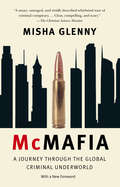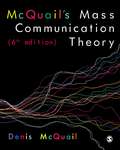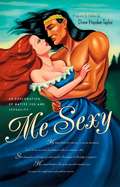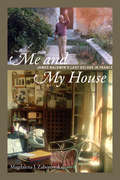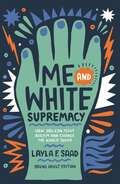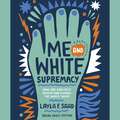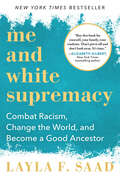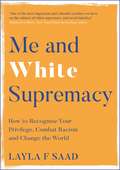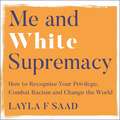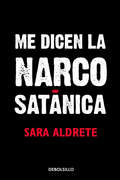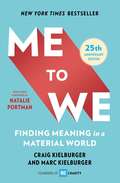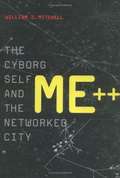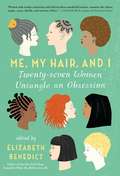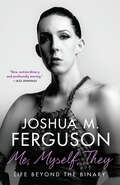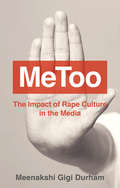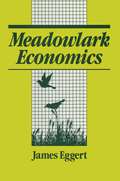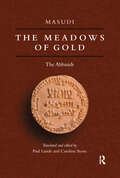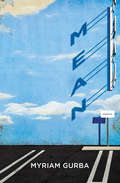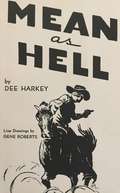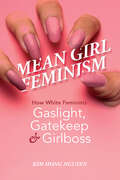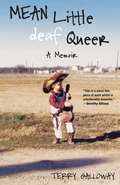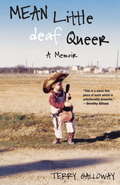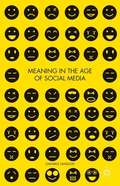- Table View
- List View
McMafia: Seriously Organised Crime
by Misha GlennyIn this powerful account, Misha Glenny takes us on a journey through the new world of international organised crime. He has travelled throughout the world - from Japan to China to Brazil to the USA and has spoken to countless gangsters, policemen and victims of organised crime while also exploring the ferocious consumer demand for drugs, trafficked women, illegal labour and arms across five continents. McMafia Brain Shot focuses on cybercrime in Brazil and people trafficking from China to Brazil, the UK and Europe and unpicks the nexus of crime, politics and money worldwide which have become entangled and interdependent in entirely novel forms since the 1980s. It argues that conventional policing methods are no longer appropriate to deal with a problem whose roots lie in global poverty and the ever widening divisions between rich and poor. BRAIN SHOTS: The byte-sized account of international crime and globalisation's dark side
McQuail's Mass Communication Theory: Mcquail: Mcquail's Mass Communication Theory 6e + Berger: Media And Communication Research Methods 2e
by Denis McquailDenis McQuail is Emeritus Professor of Mass Communication at the University of Amsterdam. He is the author of a number of seminal works in the field, including Media Performance, (1992), and Audience Analysis, (1997). Some reviews of the previous editions `This book is the most comprehensive to date in its description and evaluation of the proliferating philosophies of how the mass media do or should function in open and closed, developed and developing societies' - Media Development `An excellent, comprehensive survey of the whole range of thinking on mass media, including definitions, approaches, functions in society, production organizations and analyses of media content' - Intermedia `… Let's stress that for people who want to read a single intelligent work on mass communication. . . this is the work. Of course there must be many criticisms but the answer ' where would you find so much, so well done, so clearly done and still at an affordable price in any other single work' will be the proper one in most cases. The first work to look at as text and general survey' - Media Information Australia The Fourth Edition of this best-selling textbook provides a comprehensive, non-technical introduction to the range of approaches to understanding mass communication. Now fully revised McQuail's Mass Communication Theory: Offers an integrated treatment of the major components of mass communication: the sender, the message, and the audience; encompasses the diverse forms of mass communication in contemporary societies: television, radio, newspapers, film, music, the internet and other forms of new media; demonstrates how theories of mass communication relate to the broader understanding of society and culture; provides a glossary of nearly a hundred key terms in media and communication. Now thoroughly updated, this new edition of has been rewritten to take account of recent theory and research particularly as it relates to new media, globalisation, and topics in respect of cultural production, such as advertising, marketing, fashion, and merchandising. Retaining all the strengths of the previous editions, McQuail's Mass Communication Theory remains the most integrated and comprehensive introduction to the field.
Me Sexy
by Drew Hayden TaylorIs Cree really the sexiest of all languages? Do Native people have less or more public hair? Does Inuit sex have a dark side? These are some of the questions answered in this witty, thoughtful collection.<><P> Twelve important voices in the Native culture - including Joseph Boyden, author of Three Day Road, and Marissa Crazytrain, a descendant of Chief Sitting Bull - tackle a variety of previously taboo subjects with humor and insight. Noted comic writer and editor Drew Hayden Taylor wraps it up with an original contribution of his own.
Me and My House: James Baldwin's Last Decade in France
by Magdalena J. ZaborowskaThe last sixteen years of James Baldwin's life (1971–87) unfolded in a village in the South of France, in a sprawling house nicknamed “Chez Baldwin.” In Me and My House Magdalena J. Zaborowska employs Baldwin’s home space as a lens through which to expand his biography and explore the politics and poetics of blackness, queerness, and domesticity in his complex and underappreciated later works. Zaborowska shows how the themes of dwelling and black queer male sexuality in The Welcome Table, Just above My Head, and If Beale Street Could Talk directly stem from Chez Baldwin's influence on the writer. The house was partially torn down in 2014. Accessible, heavily illustrated, and drawing on interviews with Baldwin's friends and lovers, unpublished letters, and manuscripts, Me and My House offers new insights into Baldwin's life, writing, and relationships, making it essential reading for all students, scholars, and fans of Baldwin.
Me and White Supremacy (YA Edition)
by Layla Saad'This book should be mandatory reading for all young people' - Pragya Agarwal'I wish this book had been around when I was a kid. . . If every child read it, the world would be transformed. This book will make the world a much better place for all of us' - Mikaela Loach'Full of knowledge, cultural reference points and practical guidance, I will absolutely be referring to this in my own anti-racism journey and encourage others to do so too' - Jeffrey Boakye_________________Me and White Supremacy has sold over 150,000 copies and was shortlisted for the Non-Fiction Book of the Year award at the British Book Awards. Now, with this YA edition, Layla will help younger readers to feel more confident talking about white supremacy and antiracism. Layla gives them the knowledge and practical tools they need to help change the world, now and for the generations that come after them.Me and White Supremacy became one of the most talked about books of 2020. It isn't just a book that you read, it is a book that you do, and it has the power to make you question the world you live in whilst giving you the tools to do something to change it. In this Young Adult edition, Layla has completely reworked the original to address readers of 11+ and of all races to help them explore and better understand racism. The book is based on the understanding that it is important for all young people to understand these topics, so they can grow into adults who know how to have conversations about race and racism as well as how to work together collectively to create an antiracist world.Like the original book, this edition guides readers through the different concepts that contribute to white supremacy and explores how they can help dismantle it to create a fairer world. It is written in such a way that it can be worked through together as a group, in class, or individually, and over any period of time.
Me and White Supremacy (YA Edition)
by Layla SaadMe and White Supremacy has sold over 150,000 copies and was shortlisted for the Non-Fiction Book of the Year award at the British Book Awards. Now, with this YA edition, Layla will help younger listeners to feel more confident talking about white supremacy and antiracism. Layla gives them the knowledge and practical tools they need to help change the world, now and for the generations that come after them.Me and White Supremacy became one of the most talked about books of 2020. It isn't just an audiobook that you listen to, it is an audiobook that you do, and it has the power to make you question the world you live in whilst giving you the tools to do something to change it. In this Young Adult edition, Layla has completely reworked the original to address listeners of 11+ and of all races to help them explore and better understand racism. The audiobook is based on the understanding that it is important for all young people to understand these topics, so they can grow into adults who know how to have conversations about race and racism as well as how to work together collectively to create an antiracist world.Like the original audiobook, this edition guides listeners through the different concepts that contribute to white supremacy and explores how they can help dismantle it to create a fairer world. It is written in such a way that it can be worked through together as a group, in class, or individually, and over any period of time.(P) 2022 Hodder & Stoughton Limited
Me and White Supremacy: Combat Racism, Change the World, and Become a Good Ancestor
by Layla SaadBased on the viral Instagram challenge that captivated participants worldwide, Me and White Supremacy takes readers on a 28-day journey of how to dismantle the privilege within themselves so that they can stop (often unconsciously) inflicting damage on people of color, and in turn, help other white people do better, too. <P><P>When Layla Saad began an Instagram challenge called #meandwhitesupremacy, she never predicted it would spread as widely as it did. She encouraged people to own up and share their racist behaviors, big and small. She was looking for truth, and she got it. Thousands of people participated in the challenge, and nearly 100,000 people downloaded the Me and White Supremacy Workbook. <P><P>Updated and expanded from the original workbook, Me and White Supremacy,takes the work deeper by adding more historical and cultural contexts, sharing moving stories and anecdotes, and including expanded definitions, examples, and further resources.Awareness leads to action, and action leads to change. The numbers show that readers are ready to do this work—let's give it to them. <P><P><b>A New York Times Bestseller</b>
Me and White Supremacy: How to Recognise Your Privilege, Combat Racism and Change the World
by Layla Saad'An indispensable resource for white people who want to challenge white supremacy but don't know where to begin' Robin DiAngelo, author of New York Times bestseller WHITE FRAGILITY'It should be mandatory reading ... Buy the book, do the work and then push more copies into the hands of everyone you know' Emma Gannon'Confrontational and much-needed' Stylist'She is no-joke changing the world and, for what it's worth, the way I live my life.'Anne Hathaway___________Me and White Supremacy shows readers how to dismantle the privilege within themselves so that they can stop (often unconsciously) inflicting damage on people of colour, and in turn, help other white people do better, too.When Layla Saad began an Instagram challenge called #MeAndWhiteSupremacy, she never predicted it would spread as widely as it did. She encouraged people to own up and share their racist behaviours, big and small. She was looking for truth, and she got it. Thousands of people participated, and over 90,000 people downloaded the book.The updated and expanded Me and White Supremacy takes the work deeper by adding more historical and cultural contexts, sharing moving stories and anecdotes, and including expanded definitions, examples, and further resources.Awareness leads to action, and action leads to change. The numbers show that readers are ready to do this work - let's give it to them.
Me and White Supremacy: How to Recognise Your Privilege, Combat Racism and Change the World
by Layla SaadWhite supremacy is a violent system of oppression that harms Black, Indigenous and People of Colour and if you are a person who holds white privilege, then you are complicit in upholding that harm, whether you realise it or not. And if you are person who holds white privilege, the question you should be asking isn't whether or not this is true, but rather, what are you going to do about it?Between June and July 2018, Layla Saad ran a 28-day Instagram challenge under the hashtag #MeAndWhiteSupremacy, for people with white privilege to unflinchingly examine the ways that they are complicit in upholding the oppressive system of white supremacy.The challenge quickly went viral, with thousands of people from all over the world (including USA, Canada, UK, Italy, Germany, The Netherlands, Russia, UK, Australia, New Zealand, Thailand and Qatar, among others) diving deep for 28 consecutive days to examine and take responsibility for the ways in which they uphold white supremacy. The challenge catalyzed a worldwide awakening for thousands of white-privileged people to begin to take ownership of their personal anti-racism work.The updated and expanded Me and White Supremacy takes the work deeper by adding more historical and cultural contexts, sharing moving stories and anecdotes, and including expanded definitions, examples, and further resources.Awareness leads to action, and action leads to change. The numbers show that readers are ready to do this work - let's give it to them.This workbook was born out of that challenge and the results have been life-changing. (P) 2020 Quercus Editions Limited
Me dicen la narcosatánica
by Sara AldreteLa fascinante historia atrás de los homicidios de la secta santera contada por Sara Aldrete, La Narcosatánica. Sara Aldrete, por primera vez tras varios años de encierro en el reclusorio Femenil Oriente, ha decidido contar la historia de los narcosatánicos y su propia historia. Con una prosa ágil, incisiva e inteligente, no desprovista de humor aunque lacerada por el dolor y la angustia, Aldrete narra cómo conoció al cubano Adolfo de Jasús Constanzo El Padrino y a los demás miembros de la secta santera, acusada de 13 homicidios, descuartizamiento de cadáveres, brujería y una larga lista de delitos que dieron lugar a uno de los casos má célebres y extraños del crimen en México.
Me to We: Finding Meaning in a Material World
by Craig Kielburger Marc KielburgerImagine waking up every morning believing that your actions can make a significant change in the world. For everyone who has ever yearned for a better life and a better world, Craig and Marc Kielburger share a blueprint for personal and social change that has the power to transform lives one act at a time. Through inspirational contributions from people from all walks of life and moving stories drawn from more than a decade of their experience as international change-makers, the Kielburgers reveal that a more fulfilling path is ours for the taking when we find the courage to reach out. Me to We is an approach to life that leads us to recognize what is truly valuable, make new decisions about the way we want to live, and redefine the goals we set for ourselves and the legacy we want to leave. Above all, it creates new ways of measuring meaning, happiness, and success in our lives, and makes these elusive goals attainable at last. After you've absorbed the ideas presented in this book, your life may not end up as you had envisioned. You may not acquire a house on a beach in the Caymans, but you may find your toes grounded in the sand. You may not see an enormous change in your social life, but in your life you may very well see enormous social change. You may not find the person of your dreams, but you will help people young and old go beyond their's. This book will open your eyes and change the way you look at life. Treat it as an invitation: an invitation to discover the power of the Me to We philosophy and to join the growing community of people around the world who are embracing this way of life.
Me++: The Cyborg Self and the Networked City
by William J. MitchellWilliam Mitchell describes the transformation of wireless technology in the hundred years since Marconi; the scaling up of networks and the scaling down of the apparatus for transmission and reception.
Me, My Hair, And I: Twenty-Seven Women Untangle an Obsession
by Elizabeth BenedictAsk a woman about her hair, and she just might tell you the story of her life. Ask a whole bunch of women about their hair, and you could get a history of the world. Surprising, insightful, frequently funny, and always forthright, the essays in Me, My Hair, and I are reflections and revelations about every aspect of women’s lives from family, race, religion, and motherhood to culture, health, politics, and sexuality. They take place in African American kitchens, at Hindu Bengali weddings, and inside Hasidic Jewish homes. The conversation is intimate and global at once. Layered into these reminiscences are tributes to influences throughout history: Jackie Kennedy, Lena Horne, Farrah Fawcett, the Grateful Dead, and Botticelli’s Venus. The long and the short of it is that our hair is our glory—and our nemesis, our history, our self-esteem, our joy, our mortality. Every woman knows that many things in life matter more than hair, but few bring as much pleasure as a really great hairdo.
Me, Myself, They: Life Beyond the Binary
by Luna M. FergusonFrom renowned trans activist, Luna M. Ferguson, comes a work of memoir and critical analysis that embraces an inclusive understanding of sex and gender.Me, Myself, They: Life Beyond the Binary chronicles Luna M. Ferguson’s extraordinary story of transformation to become a celebrated non-binary filmmaker, writer, and advocate for trans rights. Beginning with their birth and early childhood of gender creativity, Ferguson recounts the complex and often challenging evolution of their identity, including traumatizing experiences with gender conversion therapy, bullying, depression, sexual assault, and violence. Above all, Ferguson’s story is about survival, empathy, and self-acceptance. By combining personal reflections on what it feels like to never truly fit into prescribed roles of male and female, and using an informed analysis of the ongoing shifts in contemporary attitudes towards sex and gender, Ferguson calls for an inclusive understanding of diverse human identity and respect for trans, non-binary, and gender-nonconforming people. Through their honest and impassioned storytelling, we learn what it means to reclaim one’s identity and to live beyond the binary.
MeToo: The Impact of Rape Culture in the Media
by Meenakshi Gigi DurhamIn the wake of the MeToo movement, revelations of sexual assault and harassment continue to disrupt sexual politics across the globe. Reports of widespread misconduct—in workplaces from doctors’ offices to factory floors—precipitate firings, legal actions, street protests, and policy punditry. Meenakshi Gigi Durham situates media culture as a place in which these broader social struggles are produced and reproduced. The media figures whose depravity sparked the #MeToo movement are symbols of the complexities of sexual desire and consent. Pop culture fuels controversies about rape culture; social media users have launched feminist resistance that turned to real-world activism; and investigative journalists have broken stories of assault, offering a platform for survivors to speak truth to patriarchal power. Arguing that the media are a linchpin in these events, Durham provides a feminist account of the interrelated contexts of media production, representation, and reception. She situates the media as the key site where the establishment of sexuality and social relations takes place, and traces the media's powerful role in both reifying and challenging rape culture. This timely and stimulating book will be of interest to students and scholars of media, communication, gender studies, and sociology, as well as to anyone concerned by the current state of sexual politics.
Meadowlark Economies: Work and Leisure in the Ecosystem
by Jim EggertFirst Published in 2017. The author shares their feelings about enjoying and preserving the natural environment, yet this book also reveals a conflict in values that the most committed ecologist must face. Such conflict pits the powerful American values of individual freedom and rights against the values of community necessary for sustaining the environment. In publishing this collection of essays, the author hopes to contribute to more enlightened economic analysis and more relevant and effective policies that are good for both the economy and the global ecology.
Meadows Of Gold: Entitled Meadows Of Gold And Mines Of Gems (Great Journeys Ser. #No. 2)
by MasudiFirst published in 1989. Routledge is an imprint of Taylor & Francis, an informa company.
Mean
by Myriam Gurba“A painfully timely story . . . an artful memoir . . . a powerful, vital book about damage and the ghostly afterlives of abuse.” —Los Angeles Review of Books True crime, memoir, and ghost story, Mean is the bold and hilarious tale of Myriam Gurba’s coming of age as a queer, mixed-race Chicana. Blending radical formal fluidity and caustic humor, Gurba takes on sexual violence, small towns, and race, turning what might be tragic into piercing, revealing comedy. This is a confident, intoxicating, brassy book that takes the cost of sexual assault, racism, misogyny, and homophobia deadly seriously. We act mean to defend ourselves from boredom and from those who would chop off our breasts. We act mean to defend our clubs and institutions. We act mean because we like to laugh. Being mean to boys is fun and a second-wave feminist duty. Being rude to men who deserve it is a holy mission. Sisterhood is powerful, but being a bitch is more exhilarating . . . “Mean calls for a fat, fluorescent trigger warning start to finish—and I say this admiringly. Gurba likes the feel of radioactive substances on her bare hands.” —The New York Times “Gurba uses the tragedies, both small and large, she sees around her to illuminate the realities of systemic racism and misogyny, and the ways in which we can try to escape what society would like to tell us is our fate.” —Nylon “With its icy wit, edgy wedding of lyricism and prose, and unflinching look at personal and public demons, Gurba’s introspective memoir is brave and significant.” —Kirkus Reviews “Mean will make you LOL and break your heart.” —The Millions
Mean As Hell: The Life of a New Mexico Lawman
by Gene Roberts Dee HarkeyNew Mexico rancher and lawman Dee (Daniel R.) Harkey describes himself as having “been shot at more times than any man in the world not engaged in war.” Mean as Hell, originally published in 1948 when Harkey was 83, is his detailed, witty autobiography about his youth in San Saba County of west Texas, where in 1882 he learned from his brother Joe, the sheriff, to “be damned sure you don’t get killed, but don’t kill anybody unless you have to” and his adult life in Eddy County after moving to Karlsbad (then Eddy) in 1890.Harkey served as a New Mexico peace officer from 1893 until 1911. Among the many cattle rustlers, train robbers, and other outlaws he confronted were Jim Miller, whom Harkey fingers as Pat Garrett’s real killer, and the Dalton Gang. Harkey observes that, in 1948, “cattle stealing has gone out of fashion. We’ve gotten civilized. Instead..., we now have statesman who practice nepotism, pad the public payrolls and graft as much as they think they can get away with (in an honorable way, of course) just like the folks back east.”Readers interested in many aspects of the territorial and outlaw West will enjoy Dee Harkey’s lively stories.
Mean Girl Feminism: How White Feminists Gaslight, Gatekeep, and Girlboss (Feminist Media Studies)
by Kim Hong NguyenWhite feminists performing to maintain privilege Mean girl feminism encourages girls and women to be sassy, sarcastic, and ironic as feminist performance. Yet it coopts its affect, form, and content from racial oppression and protest while aiming meanness toward people in marginalized groups. Kim Hong Nguyen’s feminist media study examines four types of white mean girl feminism prominent in North American popular culture: the bitch, the mean girl, the power couple, and the global mother. White feminists mime the anger, disempowerment, and resistance felt by people of color and other marginalized groups. Their performance allows them to pursue and claim a special place within established power structures, present as intellectually superior, substitute nonpolitical playacting for a politics of solidarity and community, and position themselves as better, more enlightened masters than patriarchy. But, as Nguyen shows, the racialized meanness found across pop culture opens possibilities for building an intersectional feminist politics that rejects performative civility in favor of turning anger into liberation.
Mean Justice: A Town's Terror, A Prosecuter's Power, A Betrayak
by Edward HumesThis national bestseller from the Pulitzer Prize-winner catapults readers to the dark side of the justice system with the powerful true story of one man's battle to prove his innocence.Besieged by murder, rape, and the vilest conspiracies, the all-American town of Bakersfield, California, found its saviors in a band of bold and savvy prosecutors who stepped in to create one of the toughest anti-crime communities in the nation. There was only one problem: many of those who were arrested, tried, and imprisoned were innocent citizens. In a work as taut and exciting as a suspense novel, Pulitzer Prize-winning author and journalist Edward Humes embarks on a chilling journey to the dark side of the justice system. He reveals the powerful true story of retired high-school principal Pat Dunn's battle to prove his innocence, and how he was the victim of a case tainted by hidden witnesses, concealed evidence, and behind-the-scenes lobbying by powerful politicians. Humes demonstrates how the mean justice dispensed in Bakersfield is part of a growing national trend in which innocence has become the unintended casualty of today's war on crime.
Mean Justice: A Town's Terror, A Prosecutor's Power, a Betrayal of Innocence
by Edward HumesBesieged by murder, rape, and the most vile conspiracies, the all-American town of Bakersfield, California, found its saviors in a band of bold and savvy prosecutors who stepped in to create one of the toughest anti-crime communities in the nation. There was only one problem: many of those who were arrested, tried, and imprisoned were innocent citizens. In a work as taut and exciting as a suspense novel, Pulitzer Prize-winning author and journalist Edward Humes embarks on a chilling journey to the dark side of the justice system. He reveals the powerful true story of retired high-school principal Pat Dunn's battle to prove his innocence. And how Dunn, prosecuted for killing his wife to inherit her millions, was the victim of a case tainted by hidden witnesses, concealed evidence, and behind-the-scenes lobbying by powerful politicians. Even more disturbing, Humes demonstrates how the mean justice dispensed in Bakersfield is part of a growing national trend in which innocence has become the unintended casualty of today's war on crime. American cities are enjoying their lowest crime rates in decades. But at what price? Mean Justice provides answers both compelling and frightening.
Mean Little Deaf Queer: A Memoir
by Terry GallowayIn 1959, the year Terry Galloway turned nine, the voices of everyone she loved began to disappear. No one yet knew that an experimental antibiotic given to her mother had wreaked havoc on her fetal nervous system, eventually causing her to go deaf. As a self-proclaimed "child freak," she acted out her fury with her boxy hearing aids and Coke-bottle glasses by faking her own drowning at a camp for crippled children. Ever since that first real-life performance, Galloway has used theater, whether onstage or off, to defy and transcend her reality. With disarming candor, she writes about her mental breakdowns, her queer identity, and living in a silent, quirky world populated by unforgettable characters. What could have been a bitter litany of complaint is instead an unexpectedly hilarious and affecting take on life.
Mean Little deaf Queer: A Memoir
by Terry GallowayIn 1959, the year Terry Galloway turned nine, the voices of everyone she loved began to disappear. No one yet knew that an experimental antibiotic given to her mother had wreaked havoc on her fetal nervous system, eventually causing her to go deaf. As a self-proclaimed "child freak," she acted out her fury with her boxy hearing aids and Coke-bottle glasses by faking her own drowning at a camp for crippled children. Ever since that first real-life performance, Galloway has used theater, whether onstage or off, to defy and transcend her reality. With disarming candor, she writes about her mental breakdowns, her queer identity, and living in a silent, quirky world populated by unforgettable characters. What could have been a bitter litany of complaint is instead an unexpectedly hilarious and affecting take on life.
Meaning In The Age Of Social Media
by Ganaele LangloisThe search for meaning is an essential human activity. It is not just about agreeing on some definitions about the world, objects, and people; it is an ethical process of opening up to find new possibilities. Langlois uses case studies of social media platforms (including Facebook, Twitter, and Amazon) to revisit traditional conceptions of meaning.
